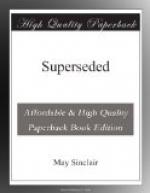“Oh Love, unconquered in fight. Love who—Love who fliest, who fliest about among things,” said the student. And the teacher laughed.
Laughed, for the entertaining blunder called up a vivid image of the god in Miss Quincey’s drawing-room, fluttering about among the furniture and doing terrific damage with his wings.
“What’s wrong?” asked the student.
“Oh nothing; only a slight confusion between flying about and falling upon. ‘Oh Love who fallest on the prey’; please go on.”
“’Oh Love who fallest on the prey’—” The chorus mumbled and stumbled, and the student sighed heavily, for the Greek was hard. “He who has—he who has—Oh dear, I can’t see any sense in these old choruses; I do hate them.”
“Still,” said Rhoda sweetly, “you mustn’t murder them. ’He who has love has madness.’”
The chorus limped to its end and the student left the coach to some curious reflections.
“Eros anikate machan!”
“Oh Love, unconquered in fight!” It sang in her ears persistently, joyously, ironically—a wedding-song, a battle-song, a song of victory.
Bastian Cautley was right when he said that the race was to the swift and the battle to the strong. How eager she had been for the fight, how mad for the crowded course! She had rushed on, heat after heat, outstripping all competitors and carrying off all the crowns and the judges’ compliments at the end of the day. She loved the race for its own sake, this young athlete; and though she took the crowns and the compliments very much as a matter of course, she had come to look on life as nothing but an endless round of Olympic games. And just as she forgot each successive event in the excitement of the next, she also had forgotten the losers and those who were tumbled in the dust. Until she had seen Miss Quincey.
Miss Quincey—so they had let her come to this among them all? They had left her so bare of happiness that the first man (it happened to be her doctor) who spoke two kind words to her became necessary to her existence. No, that was hardly the way to put it; it was underrating Bastian Cautley. He was the sort of man that any woman—But who would have thought it of Miss Quincey? And the really sad thing was that she did not think it of herself; it showed how empty of humanity her life had been. It was odd how these things happened. Miss Quincey was neither brilliant nor efficient, but she had made the most of herself; at least she had lived a life of grinding intellectual toil; the whole woman had seemed absorbed in her miserable arithmetical function. And yet at fifty (she looked fifty) she had contrived to develop that particular form of foolishness which it was Miss Cursiter’s business to exterminate. There were some of them who talked as if the thing was done; as if competitive examinations had superseded the primitive rivalry of sex.
Bastian Cautley was right. You may go on building as high as you please, but you will never alter the original ground-plan of human nature. And how she had scoffed at his “man’s view”; how indignantly she had repulsed his suggestion that there was a side to the subject that her friends the idealists were much too ideal to see.




